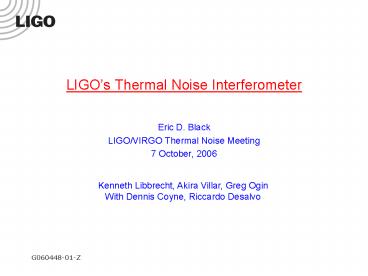LIGOs Thermal Noise Interferometer
1 / 13
Title: LIGOs Thermal Noise Interferometer
1
LIGOs Thermal Noise Interferometer
- Eric D. Black
- LIGO/VIRGO Thermal Noise Meeting
- 7 October, 2006
Kenneth Libbrecht, Akira Villar, Greg Ogin With
Dennis Coyne, Riccardo Desalvo
2
Direct Measurement of Mirror Thermal Noise
- Short arm cavities, long mode cleaner (frequency
reference) reduce laser frequency noise, relative
to test cavity length noise. - Measurement made as relevant to LIGO, AdLIGO as
possible. - Want to measure thermal noise at as low a level
as possible in a small interferometer. - Low-mechanical-loss substrates Fused Silica,
Sapphire - Silica-Tantala coatings
- Largest practical spot size
3
TNI direct measurement of coating thermal noise
- Silica-tantala coatings on fused silica
substrates - Multiple calibrations performed.
- Noise source (in thermal noise band) localized
inside cavities - Assuming isotropic model, coating loss angle
agrees with Penn, et al. ringdown measurement
- Assuming anisotropic model,
4
Sapphire
- Noise floor in Sapphire dominated by Substrate
Thermoelastic noise. - Parameters
- a 2.7e-6 K-1
- k 44 W/mK
- Braginskys model validated in Sapphire - First
measurement in AdLIGO candidate substrate material
5
Doped Tantala (Ti-Ta2O5/SiO2) Coatings
- Doping the high-index layers (tantalum pentoxide)
with titanium reduces the noise floor. - Upper blue line noise floor with undoped
coatings - Lower blue line noise floor with titanium-doped
coatings - Reduction in noise floor is slightly greater than
expected from Q measurements (end of range).
6
Parametric Instability
Ju, et al. G050325-00
7
Condition for Instability
Mechanical Q
Anti-Stokes mode
Stokes Mode
8
Possible Solutions
- Active feedback
- Thermal detuning
- Q reduction
9
Buna O-Rings
- Buna, 1/8 thick, undersized diameter (3.25)
- Q reduction is too large to measure by ringdown
cant excite modes - Substantial increase in the noise floor from
200Hz to 4kHz - Still thermal noise limited above 5kHz
10
Kapton Tape
- Essentially massless, to avoid waving modes
seen with buna. - Lossy strip closely approximates models of Gras,
Blair, et al. - No observed increase in the noise floor
- Q reductions range from factor of 2 to none at
all
No ring damper Buna o-ring Kapton tape
11
Waving modes of rings
Free end (anti-node)
Shear wave equation (transverse waves)
wave speed
Mirror substrate (node)
Predicts fundamental f 145 kHz for 4 mm copper
ring - Well out of thermal noise region
12
Copper rings
- Buna, kapton results tell us
- Need mass to damp mirror Qs
- Need waving mode well above the measurement
band - Ultimate plan was to use monolithic rings,
expanded by heating for installation - Use screw tension for prototypes
- Qs were reduced below our ability to excite the
modes, as with buna. - Noise floor increases, showing both new modes and
additional broadband noise.
13
Aperiodic Coatings
- Goal reduce high-loss material in HR coating by
varying layer thickness, while preserving phase
relationship for reflection - Collaboration with
- Vincenzo Galdi and Innocenzo Pinto at Benevento
(coating design), - LMA at Lyon (fabrication and loss measurements),
and - Sheila Rowan at Glasgow (loss measurements)
- Gains from and design of optimization depend on
how different the loss angles are between high-
and low-index materials. - We have well-confirmed measurements of
, but is more subtle. - Best measurements now
- Coatings are being fabricated at LMA. We will
measure their noise floors at the TNI when they
are done.































